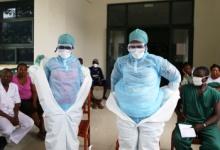
Typical street scene in Santa Ana, El Salvador. (Photo: iStock)
IMF Survey : IMF Approves $130 Million for Countries Worst Hit by Ebola
September 26, 2014
- Guinea, Liberia, Sierra Leone face big revenue shortfalls, new spending needs
- IMF involvement reflects mounting macroeconomic impact of outbreak
- IMF committed to working with countries, partners says IMF chief Lagarde
As the death toll from Ebola rises and the economic impact of the crisis spreads, the IMF has stepped in to provide a total of $130 million of emergency financial assistance to Guinea, Liberia, and Sierra Leone, the three West African countries at the center of the epidemic.

Medical workers in Freetown learn how to protect themselves against Ebola during a training session (Xinhua/Huang Xianbin).
EBOLA EPIDEMIC
The IMF Executive Board approved the financing on an accelerated, emergency basis September 26 in order to help cover a substantial portion of a financing gap, provisionally estimated to total some $300 million, that has emerged from the humanitarian crisis. The countries are grappling with the Ebola outbreak with fragile institutions and ill-equipped medical systems, and are facing substantial revenue shortfalls and additional spending needs to combat the outbreak.
The involvement of the IMF in the crisis reflects the mounting macroeconomic impact of the crisis on countries that were making strides in overcoming years of fragility and instability. The additional financial assistance to help combat the epidemic fits within the Fund’s mandate to support its member countries in times of economic and social stress as they address balance of payments and fiscal financing needs.
Growing economic impact
“The Ebola outbreak in Guinea, Liberia, and Sierra Leone has already cost too many lives,” said IMF Managing Director Christine Lagarde. “This humanitarian crisis could also have deep economic consequences. The governments of Guinea, Liberia and Sierra Leone requested IMF support to enhance their efforts to contain this unprecedented epidemic that is disproportionately affecting the most vulnerable in their populations. The IMF is working hard with the authorities of the affected countries and their development partners to ensure that the outbreak is quickly brought under control and to assist the economic rebuilding effort that must follow.”
The financing arrangements amount to 25 percent of each country’s quota at the IMF, and break down as follows:
• Guinea: The Board approved $41.4 million under the Rapid Credit Facility (RCF). The Ebola outbreak started in Guinea by end-2013 and intensified sharply from July, although it has been hit somewhat less hard than its neighbors. The country’s short-term economic outlook has deteriorated substantially, with 2014 growth expected to fall from a 4.5 percent projected at the beginning of the year to 2.4 percent. Guinea is making satisfactory progress under its existing arrangement under the Extended Credit Facility (ECF) but will receive emergency funding under the RCF arrangement because the most recent review under the ECF arrangement is pending.
• Liberia: The Executive Board approved a $48.3 million augmentation of an existing arrangement under the ECF. At this point Liberia is the country most affected by the epidemic, which has overwhelmed its capacity to respond. In addition to the heavy human toll, the outbreak is having a severe economic and social impact that could jeopardize gains from a decade of peace. Based on preliminary estimates, real GDP growth is projected to decline from 6 percent to 2.5 percent in 2014 as the key sectors of the economy, namely mining, services, and agriculture, are all severely disrupted.
• Sierra Leone: The country will receive a $39.8 million ECF augmentation. Ebola has spread to the entire country, severely affecting the social and economic fabric. Growth is slowing—from 11.3 percent to 8 percent this year, based on the August estimate—inflationary pressures have intensified, and new balance of payments and fiscal financing needs have emerged.
“A health crisis of this magnitude inevitably will have a severe economic impact, and it is the responsibility of the IMF to assist countries to remain on their feet,” said Antoinette Sayeh, Director of the IMF African Department. “We are working closely with our counterparts in all three countries to provide the financing and advice that can make a difference in their struggle against Ebola.”
Infection pace quickens
The Ebola epidemic—a haemorrhagic fever that originates in wild animals—emerged in Guinea early this year and subsequently spread to neighboring Liberia and Sierra Leone. According to the World Health Organization (WHO), about 6,000 people are known to have been infected in the three countries (with a handful of cases in Nigeria and Senegal, where the virus now appears contained) and around 3,000 are reported to have died.
However, the actual toll is likely to be higher, as there is evidence of substantial under-reporting of cases and deaths. Furthermore, the pace of infection has accelerated in recent weeks, particularly in Liberia and, to a lesser extent, in Sierra Leone.
The three affected countries have struggled to mount an effective defense against Ebola’s spread in large part because of extremely limited public health capabilities. An increasing number of international organizations have become involved, including the United Nations and WHO, the World Bank, the African Development Bank, and leading nongovernmental organizations such as Doctors Without Borders and the Red Cross. Governments as well as private local and international donors also have committed significant resources.


